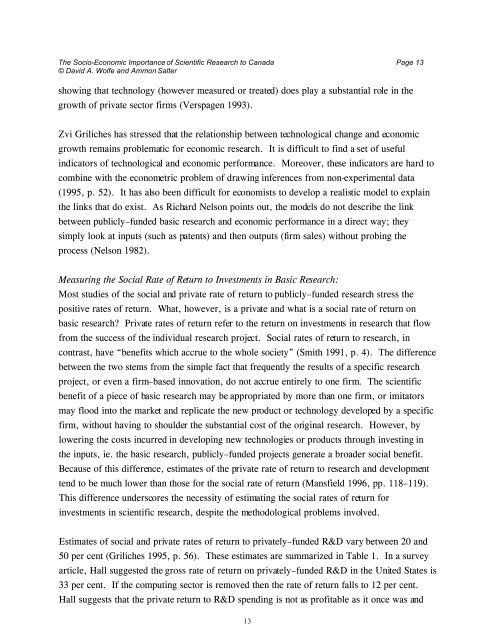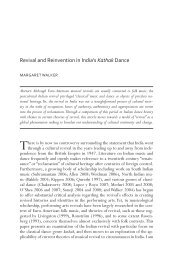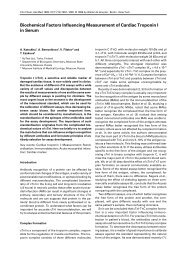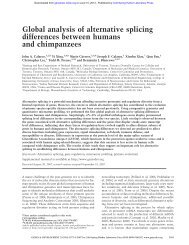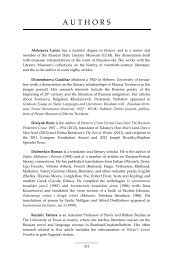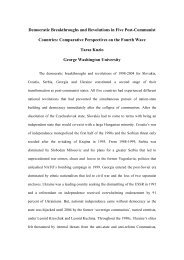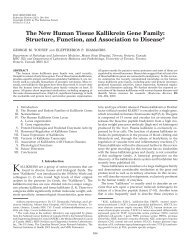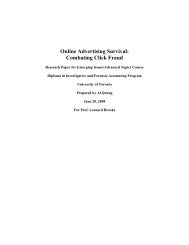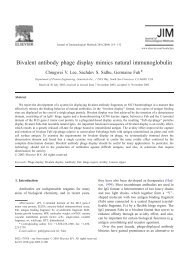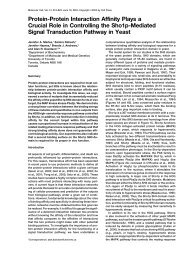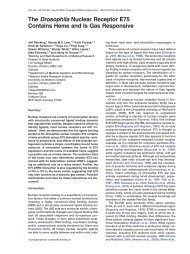The Socio-Economic Importance of Scientific Research To Canada
The Socio-Economic Importance of Scientific Research To Canada
The Socio-Economic Importance of Scientific Research To Canada
You also want an ePaper? Increase the reach of your titles
YUMPU automatically turns print PDFs into web optimized ePapers that Google loves.
<strong>The</strong> <strong>Socio</strong>-<strong>Economic</strong> <strong>Importance</strong> <strong>of</strong> <strong>Scientific</strong> <strong>Research</strong> to <strong>Canada</strong> Page 13© David A. Wolfe and Ammon Saltershowing that technology (however measured or treated) does play a substantial role in thegrowth <strong>of</strong> private sector firms (Verspagen 1993).Zvi Griliches has stressed that the relationship between technological change and economicgrowth remains problematic for economic research. It is difficult to find a set <strong>of</strong> usefulindicators <strong>of</strong> technological and economic performance. Moreover, these indicators are hard tocombine with the econometric problem <strong>of</strong> drawing inferences from non-experimental data(1995, p. 52). It has also been difficult for economists to develop a realistic model to explainthe links that do exist. As Richard Nelson points out, the models do not describe the linkbetween publicly–funded basic research and economic performance in a direct way; theysimply look at inputs (such as patents) and then outputs (firm sales) without probing theprocess (Nelson 1982).Measuring the Social Rate <strong>of</strong> Return to Investments in Basic <strong>Research</strong>:Most studies <strong>of</strong> the social and private rate <strong>of</strong> return to publicly–funded research stress thepositive rates <strong>of</strong> return. What, however, is a private and what is a social rate <strong>of</strong> return onbasic research? Private rates <strong>of</strong> return refer to the return on investments in research that flowfrom the success <strong>of</strong> the individual research project. Social rates <strong>of</strong> return to research, incontrast, have “benefits which accrue to the whole society” (Smith 1991, p. 4). <strong>The</strong> differencebetween the two stems from the simple fact that frequently the results <strong>of</strong> a specific researchproject, or even a firm–based innovation, do not accrue entirely to one firm. <strong>The</strong> scientificbenefit <strong>of</strong> a piece <strong>of</strong> basic research may be appropriated by more than one firm, or imitatorsmay flood into the market and replicate the new product or technology developed by a specificfirm, without having to shoulder the substantial cost <strong>of</strong> the original research. However, bylowering the costs incurred in developing new technologies or products through investing inthe inputs, ie. the basic research, publicly–funded projects generate a broader social benefit.Because <strong>of</strong> this difference, estimates <strong>of</strong> the private rate <strong>of</strong> return to research and developmenttend to be much lower than those for the social rate <strong>of</strong> return (Mansfield 1996, pp. 118–119).This difference underscores the necessity <strong>of</strong> estimating the social rates <strong>of</strong> return forinvestments in scientific research, despite the methodological problems involved.Estimates <strong>of</strong> social and private rates <strong>of</strong> return to privately–funded R&D vary between 20 and50 per cent (Griliches 1995, p. 56). <strong>The</strong>se estimates are summarized in Table 1. In a surveyarticle, Hall suggested the gross rate <strong>of</strong> return on privately–funded R&D in the United States is33 per cent. If the computing sector is removed then the rate <strong>of</strong> return falls to 12 per cent.Hall suggests that the private return to R&D spending is not as pr<strong>of</strong>itable as it once was and13


